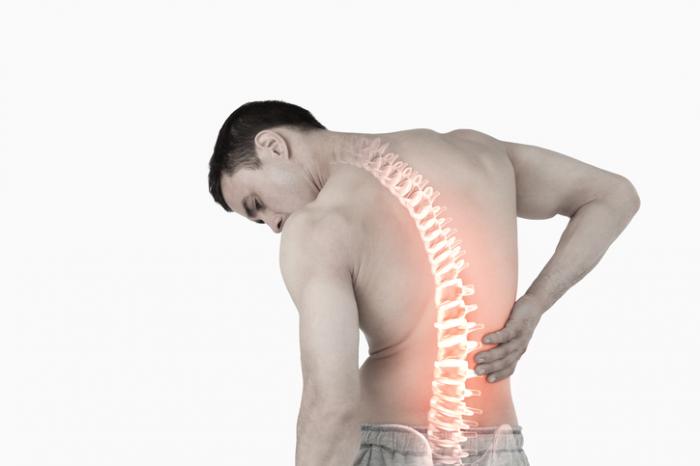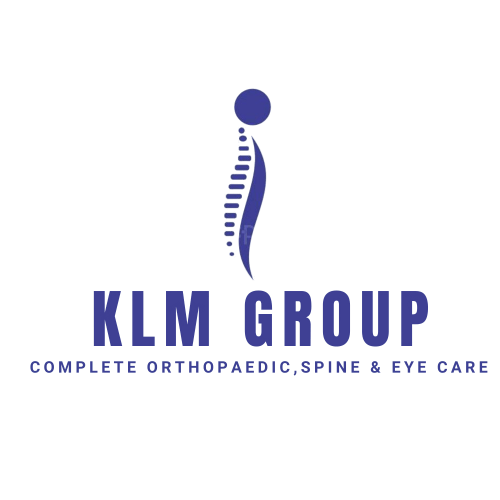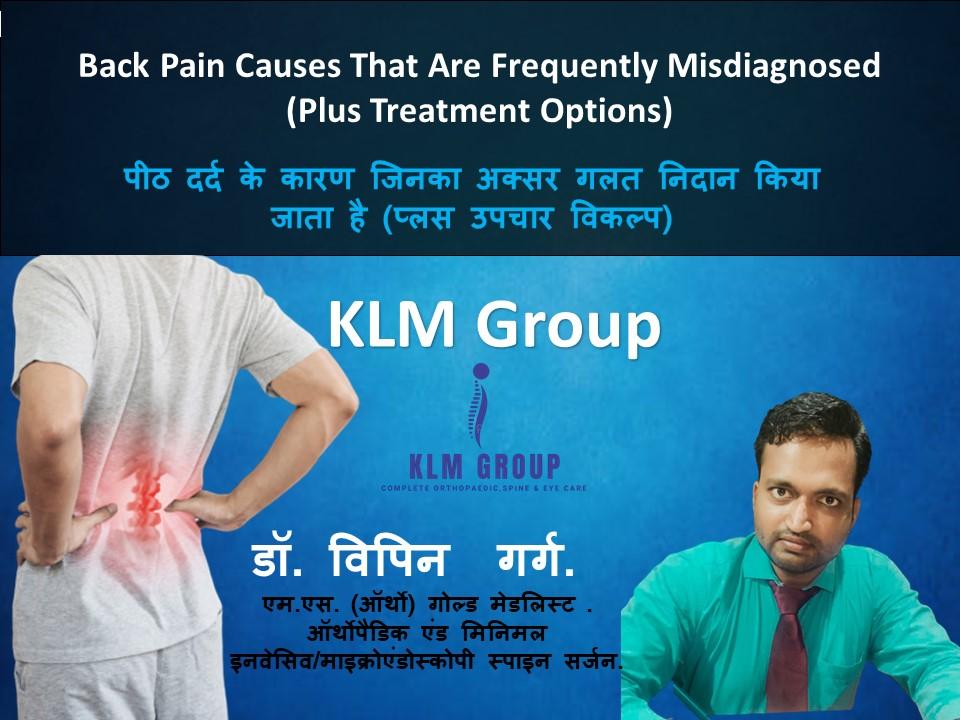Back Pain Causes That Are Frequently Misdiagnosed: If you’re suffering from chronic back pain, you need to figure out what’s causing it.
Back pain may be disheartening.
And it has an impact on many aspects of life…
Sitting, going up and down stairs, leaning down, and even getting out of bed can be terribly uncomfortable.
If you’ve seen a doctor, you may have been advised that the only way to relieve your back pain is to undergo surgery or take medicine to “manage the pain.”
These aren’t the only options, though.
Today, we’ll look at some of the most common back pain misdiagnoses, as well as non-surgical (and non-drug) therapy alternatives that work. Lets know more about Back Pain Causes.

COMMON CAUSES OF BACK PAIN
The spine is a complex web of interconnected bones, ligaments, discs, muscles, and nerves that all work together to give strength, support, and flexibility. As a result, your back can do a variety of tasks in your everyday life.
Because of its many moving components, the spine is prone to back discomfort caused by a variety of disorders that can interact with one another. Lets know more about Back Pain Causes.
Now, let’s look at a few common causes for back pain »
Herniated Discs
The jelly-like core of a disc can occasionally burst through the disc’s thick “outer wall,” causing inflammation, pinched nerves, or discomfort from the rip itself.
Bulging Discs
A bulging disc happens when a portion of the disc expands or weakens, allowing the disc’s interior contents to push outward toward the outside disc wall without bursting through. Inflammation and nerve pressure are possible side effects.
Degenerative Disc Disease
Our spinal discs are soft, malleable, and highly hydrated while we are young. Our discs lose moisture and wear out as we become older. Disc walls can weaken and tear over time, causing discomfort, instability, and other symptoms. Lets know more about Back Pain Causes.

Muscle or Soft Tissue Strains
Strains occur when the ligaments, tendons, or muscles that support your spine are injured. Muscle spasms and edoema are common side effects of several of these strains.
Pinched Nerves
A pinched nerve happens when a nerve is pressed against something. A pinched nerve, also known as cervical radiculopathy, is caused by pressure from bone spurs, ligaments, or a herniated disc. And the discomfort might spread to the hip, leg, or foot.
Spinal Stenosis
The narrowing of the regions of the spinal column through which nerves flow causes spinal stenosis. Aging is a typical cause of this, which can put strain on nerves. Lets know more about Back Pain Causes.
Spondylolisthesis
This occurs when one of the vertebrae in the lower back moves forward and out of position. It can lead to disc and nerve issues that are unpleasant.
Scoliosis
Scoliosis is a disorder that causes the spine to curve. It usually begins at birth and can increase as a person grows older, resulting in nerve pressure and other problems. Lets know more about Back Pain Causes.
Spinal Fractures
When you fracture a vertebrae in your spine, it might be caused by rapid trauma, an accident, or a fall. Spinal fractures, if left untreated, can result in persistent back discomfort.
Vertebral Compression Fractures
VCF fractures are caused by vertebral deterioration, which is most commonly caused by osteoporosis. Loss of bone density causes the vertebrae to collapse. A single VCF frequently evolves to many VCFs, resulting in a hump or hunchback that is extremely uncomfortable.
Systemic Inflammation
Chronic systemic inflammation can be induced by a variety of lifestyle and environmental variables, including nutrition, exercise, stress, smoking, and alcohol, and can result in excessive inflammation of the spinal tissues. Lets know more about Back Pain Causes.
Osteoporosis
Osteoporosis is a disorder characterized by bone thinning and loss of density. Compression fractures, a curvature of the spine, and knife-like discomfort in the back are all symptoms of osteoporosis. Lets know more about Back Pain Causes.
Osteoarthritis
This happens as a result of disc and facet joint wear and strain. Spondylosis or degenerative joint disease are other names for it.
Ankylosing Spondylitis
Arthritis spondylitis affects the spine’s joints and ligaments. It’s a kind of arthritis that produces inflammation in the joints of the spine and can cause severe, long-term discomfort.
Kyphosis
Excess curvature of the spine, commonly in the upper back, is referred to as kyphosis. This disorder is caused by several spinal fractures, resulting in a hunchback or dowager’s hump.
BACK PAIN DOCTORS HAVE A PROBLEM
If you’re like many individuals who suffer from chronic back pain, you’re on a mission to find a solution. Lets know more about Back Pain Causes.
You’re seeking for someone who can assist you and solve your situation.
So you can get back to living your life.
And live pain-free… or at the very least with a great deal less agony. Lets know more about Back Pain Causes.
Due to the intricacy of the musculoskelatal structure of the spine, certain back pain conditions are difficult to identify.
Many clinicians, including spine experts, struggle to pinpoint the specific origin of discomfort.
They either ascribe the pain to the wrong cause or don’t take the effort to properly identify the source of the discomfort.
Perhaps there is a misunderstanding between the radiologist who reads your MRI and the doctor.
Because the radiologist hasn’t checked you or even spoken to you, he or she may be guessing what’s causing your discomfort.
So, while you may be diagnosed with a herniated disc and treated for it, the true cause of your discomfort might be a spinal fracture (or some other underlying condition).
An competent and compassionate spine expert will accurately assess your issue and propose a treatment plan to address the main cause of your back pain.
BACK PAIN DRUGS ARE EPIDEMIC
Physicians have been caught in the middle of two wars in the last two decades: the war on drugs and the war on pain.
For a variety of causes, pain is severely undertreated (or mistreated).
And the problem is.
Many clinicians mistakenly believe that pain should be treated with painkillers.
While narcotic pain relievers (opioids) may provide temporary relief, they do not treat the underlying cause of back pain.
Rather, they treat the pain’s symptom rather than the underlying cause of the discomfort. A fundamental precept of medicine is that we should never treat a symptom when the underlying cause may be treated.
Narcotic pain relievers are intended to provide brief pain relief for severe or acute pain.
Opioids operate by weakening pain signals to the brain, but they don’t address the underlying causes of back pain.
Prescription opioids are plainly not intended for long-term pain management due to their negative effects, the body’s tolerance build-up over time, and the potential of addiction.
Over-prescribing of narcotic drugs, on the other hand, has increased dramatically in the previous two decades.
Resulting in an epidemic of addiction and overdose fatalities »
According to the National Institute on Drug Abuse (NIDA), between 21 and 29 percent of people who are prescribed opioids for chronic pain abuse them. Source
The National Institutes of Health has declared the condition an epidemic and is investing heavily in research and financing for improved pain treatment for chronic pain patients.
BETTER BACK PAIN TREATMENT OPTIONS
In the vast majority of situations, even for people with severe, chronic back pain, minimally invasive treatments provide a better alternative to medicines or surgery for treating back pain.
Many of these pain treatment alternatives can give long-term back pain relief while also addressing the cause of the problem.
It’s worth looking into your choices if you can avoid extensive back surgery that takes months to heal and recover from.
Here are a few alternative treatments to surgery or drugs.
Radiofrequency Ablation (RFA)
Radiofrequency ablation (also known as radiofrequency neurotomy) is a minimally invasive treatment that involves creating a heat lesion on a nerve to block pain signals from reaching the brain. The end of the device used during the process is heated using radiofrequency radiation. Because the targeted nerves aren’t involved in muscle control or sensation, the heat lesion is unlikely to damage those locations.
Kyphoplasty
Kyphoplasty is a minimally invasive medical surgery for repairing spinal fractures (vertebral compression fractures) and restoring structural integrity to the vertebrae in the spine. Kyphoplasty is an outpatient operation that restores the form and strength of collapsed vertebrae by filling them with a specific bone cement. According to studies, this technique reduces back discomfort by 72 percent and has a 94 percent success rate.
Osteoporosis Management
Osteoporosis care entails treating the complete illness – repairing damaged bones, preventing more fractures, and providing active advice on how to maintain future bone health. This might involve advice on diet, medicine, and hormone balance in order to grow stronger, healthier vertebrae to support your back. With all of the risk factors for poor bone health – including prescriptions like steroids, acid blockers, anti-depressants, and anti-anxiety meds – it’s never too early to think about how osteoporosis can affect your life and what you can do to avoid it. There are many non-surgical, less invasive osteoporosis therapy alternatives.
Epidural Steroid Injections (ESI)
An epidural steroid injection can help decrease inflammation around spinal nerves, which can help relieve pain from pinched nerves and other diseases including sciatica. A steroid (cortisone) is injected directly into the epidural portion of the spine during the surgery.
Medial Branch Block
An injection of a powerful local anaesthetic into the medial branch nerves that feed the facet joints and discs is known as a medial branch block. These nerves really transport pain sensations from the discs themselves, according to a new finding. As a result, inhibiting these neurons can alleviate a lot of the discomfort associated with disc pathologies such bulging and ruptured discs.
The facet joints, also known as zygapophysial joints, are a pair of tiny joints between the vertebrae and the back of the spine that make up the spine’s stability structure. The medial branch nerves in each facet joint can become inflamed and produce pain for a variety of reasons, including osteoarthritis, spinal stenosis, and trauma from a vehicle accident or fall.
Platelet-Rich Plasma (PRP) Therapy
Platelet-rich plasma therapy is mostly used to heal soft-tissue injuries sustained in sports. Hundreds of growth factor proteins are found in platelets in our blood, which aid in healing. Platelet-rich plasma is plasma with a 5 to 10 times higher concentration of growth factors than usual, and it has been utilised to speed up injury recovery.
HELP FOR YOUR BACK PAIN
If you or a loved one is experiencing back pain, our clinic will make an accurate diagnosis and provide a treatment plan that will bring long-term relief.
Even if you’re still in pain after back surgery…
Our office can assist you. Contact our office if you’ve undergone back surgery or feel like you’ve tried everything to get back pain relief.
Dr. Vipin GArg., is a Board Certified Microendoscopic Spine Surgeon
in Gwalior, Madhya Predesh, who focuses in bone health and interventional pain treatment.
He assists patients with minimally invasive treatments to treat back pain without surgery or pain medicines as an experienced spine expert.
Read More:
| All About Neck Pain |
| Anti-Inflammatory Foods to Try for Neck Pain |
| Spine Structure and Function |
| 20 Fun Facts About Spine! |
| How Neck Pain and Headache Can Happen At the Same Time |

BACK PAIN TREATMENT IN GWALIOR
Dr. Vipin the managing director of KLM Group. He is a well-known gold-medalist Orthopedic Surgeon In gwalior, strongly reputed for his trusted and focused attitude our rich knowledge and experience, be assured of quality healthcare and world-class medical services in Orthopaedic, Spine care In gwalior, Ophthalmology, X-ray & Diagnostics services along with physiotherapy services.
Dr. Vipin Garg.
MS(Ortho) Gold Medalist.
Orthopedic & Minimal Invasive/
Microendoscopic Spine Surgeon
Assistant Professor Dept. of Orthopedic GRMC & J.A. Hospital Gwalior.
Address: 12, Saraswati Nagar, University Road, Near Silver Estate, Thatipur, Gwalior 474006 Mob: 7804826825 Ph: 0751-4000721 Website: www.klmgroup.org Email: info@klmgroup.org / klmspineclinic.in@gmail.com

